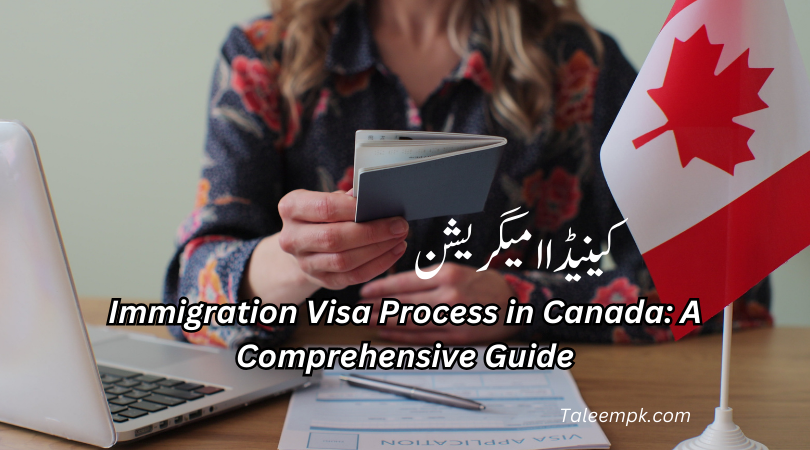Canada, known for its diverse culture, strong economy, and high quality of life, continues to be a top destination for immigrants worldwide. Whether you’re looking for better job opportunities, seeking education, or reuniting with family, understanding the Canadian immigration visa process is key to making your move a success.
In this guide, we will walk you through the entire process, from eligibility requirements to the final steps of settling in Canada. Let’s dive in!
Types of Immigration Visas to Canada
Canada offers various immigration pathways, tailored to different types of applicants. The major categories include:
1. Economic Immigration
Economic immigration is for individuals who want to immigrate to Canada for work or business purposes. These programs are designed for skilled workers, entrepreneurs, and investors.
Key Programs:
-
Express Entry System: A popular pathway for skilled workers, Express Entry is a point-based system that evaluates candidates based on factors like age, work experience, education, and language proficiency.
-
Federal Skilled Worker Program (FSWP): For individuals with foreign work experience and education.
-
Federal Skilled Trades Program (FSTP): For tradespeople like electricians, carpenters, or plumbers.
-
Canadian Experience Class (CEC): For those who have worked in Canada for at least one year on a temporary work visa.
-
Provincial Nominee Program (PNP): Allows provinces to nominate individuals based on their unique labor market needs.
2. Family Sponsorship
Canadian citizens and permanent residents can sponsor family members (spouses, common-law partners, dependent children, parents, and grandparents) for immigration to Canada.
3. Refugees and Humanitarian Immigration
This visa category is designed for individuals seeking refuge from persecution or who face life-threatening conditions in their home countries.
4. Study Permits
For those planning to study in Canada, obtaining a study permit is essential. The study permit is a temporary visa that allows international students to enroll in Canadian educational institutions.
5. Visitor Visas
If you wish to visit Canada for tourism, business, or family visits, you will need a visitor visa (Temporary Resident Visa – TRV). This visa allows individuals to stay in Canada for short periods, typically up to six months.
Eligibility Criteria for Canadian Immigration
Each immigration program has its eligibility criteria. Below are the general factors considered for most immigration pathways:
1. Age
Younger applicants generally score higher in the Express Entry system. For instance, candidates aged between 18 and 35 get more points.
2. Language Proficiency
Canada recognizes English and French as official languages. Applicants are required to prove their proficiency through recognized language tests, such as the IELTS (for English) or TEF (for French).
3. Education
A high level of education increases your chances, especially for Express Entry applicants. Those with a post-secondary degree or higher are given more points.
4. Work Experience
Work experience is an essential factor in most immigration pathways. Points are awarded based on years of experience, type of work, and job skill levels.
5. Adaptability
Factors like having a valid job offer in Canada, previous work or study experience in the country, or having a spouse or relative in Canada can significantly improve your chances.
Step-by-Step Immigration Visa Process
Step 1: Determine Your Eligibility
Before applying for an immigration visa, assess which immigration program suits you best. Use Canada’s Come to Canada tool, which will guide you through determining your eligibility for various visa options.
Step 2: Gather Documents
The immigration process requires various supporting documents. These typically include:
-
Passport or travel document
-
Educational credentials (e.g., transcripts, degrees)
-
Language test results (IELTS, CELPIP, TEF)
-
Proof of work experience (reference letters, pay stubs)
-
Police certificates (for security checks)
-
Medical exams (for certain categories of applicants)
-
Proof of funds (to demonstrate financial capability)
Step 3: Submit Your Application
Once you’ve determined the correct immigration program and gathered the necessary documents, you can submit your application online or by paper (depending on the program).
For Express Entry:
-
Create an Express Entry profile online.
-
Provide personal details, education, work experience, and language test results.
-
Wait for an invitation to apply (ITA) for permanent residency. If you are selected from the Express Entry pool, you’ll be invited to apply for permanent residence.
For Provincial Nominee Program (PNP):
-
Apply directly to a specific province or territory.
-
If nominated, you can apply for permanent residency.
Step 4: Wait for Processing
The processing time for a Canadian immigration visa varies depending on the type of visa you’re applying for. For Express Entry applicants, processing times can range from six to twelve months. Other visas, such as family sponsorship or study permits, may take longer.
During this period, you may be asked to provide additional documents or attend interviews.
Step 5: Receive Your Decision
Once your application has been processed, you will receive a decision. If approved, you will be issued a Confirmation of Permanent Residence (COPR) or visa, allowing you to move to Canada.
Step 6: Arriving in Canada
Once you arrive in Canada, you’ll go through immigration control where you’ll present your COPR and visa. At this point, a border officer will verify your documents and allow you to officially enter Canada as a permanent resident.
Post-Arrival: Settling in Canada
After you’ve successfully immigrated to Canada, the next step is to settle in your new home country. This can include:
-
Applying for a Social Insurance Number (SIN)
-
Opening a Canadian bank account
-
Finding suitable housing
-
Registering for health care (provincial healthcare plans)
-
Applying for Canadian citizenship after a few years (if desired)
Key Tips for a Successful Immigration Process:
-
Stay Informed: Immigration policies can change, so regularly check the official website of Immigration, Refugees, and Citizenship Canada (IRCC) for updates.
-
Be Honest: Provide accurate information during your application process. Any fraudulent details can result in a denial or deportation.
-
Prepare for the Wait: The immigration process can take time, especially with high volumes of applications. Patience and proper preparation are key.
